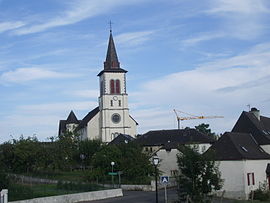You can help expand this article with text translated from the corresponding article in French. (December 2008) Click [show] for important translation instructions.
|
Esquiule
Eskiula | |
|---|---|
 The church of Esquiule | |
| Coordinates: 43°11′41″N 0°42′25″W / 43.1947°N 0.7069°W | |
| Country | France |
| Region | Nouvelle-Aquitaine |
| Department | Pyrénées-Atlantiques |
| Arrondissement | Oloron-Sainte-Marie |
| Canton | Oloron-Sainte-Marie-1 |
| Government | |
| • Mayor (2020–2026) | Maryse Artigau[1] |
| Area 1 | 28.58 km2 (11.03 sq mi) |
| Population (2021)[2] | 534 |
| • Density | 19/km2 (48/sq mi) |
| Time zone | UTC+01:00 (CET) |
| • Summer (DST) | UTC+02:00 (CEST) |
| INSEE/Postal code | 64217 /64400 |
| Elevation | 190–661 m (623–2,169 ft) (avg. 198 m or 650 ft) |
| 1 French Land Register data, which excludes lakes, ponds, glaciers > 1 km2 (0.386 sq mi or 247 acres) and river estuaries. | |
Esquiule (French pronunciation: [ɛskjul]; Basque: Eskiula)[3] is a commune in the Pyrénées-Atlantiques department in south-western France.[4]
It is located in the former province of Béarn. It stands out as an outpost of the Basque area of Soule,[3] the village being historically Basque speaking. It has often played host to the carnivalesque performances known as maskaradak and its inhabitants arranged and performed one traditional theatre piece of Soule (pastorala) under the title Madalena de Jaureguiberry in 2000.
- ^ "Répertoire national des élus: les maires" (in French). data.gouv.fr, Plateforme ouverte des données publiques françaises. 4 May 2022.
- ^ "Populations légales 2021" (in French). The National Institute of Statistics and Economic Studies. 28 December 2023.
- ^ a b ESKIULA, Auñamendi Eusko Entziklopedia (in Spanish)
- ^ INSEE commune file


